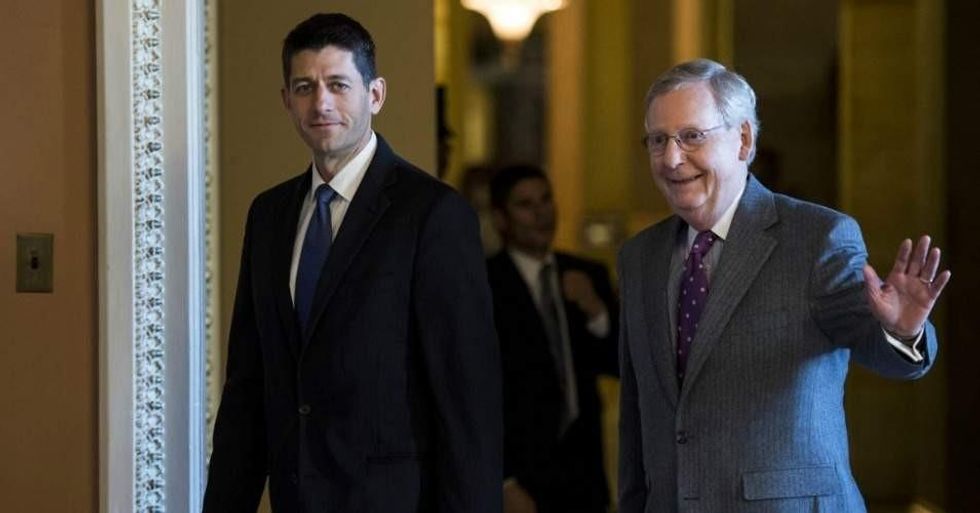

SUBSCRIBE TO OUR FREE NEWSLETTER
Daily news & progressive opinion—funded by the people, not the corporations—delivered straight to your inbox.
5
#000000
#FFFFFF
To donate by check, phone, or other method, see our More Ways to Give page.


Daily news & progressive opinion—funded by the people, not the corporations—delivered straight to your inbox.

In an analysis published on Friday, the Joint Committee on Taxation (JCT)--Congress's official scorekeeper--concluded that the final Republican tax bill doesn't come anywhere close to paying for itself and manages to be worse for the deficit and economic growth than the previous House and Senate versions.
JCT also found that, even after accounting for economic growth, the tax bill President Donald Trump just signed into law Friday will add $1.1 trillion to the federal deficit over the next decade.
But Republicans didn't bother to wait for the JCT's official analysis before ramming their bill through Congress. Instead, they relied on the "estimates" outlined by the Treasury Department, which claimed that the legislation would pay for itself--but only by taking into account legislation that hasn't even been proposed yet.
"Republicans spent years demanding the JCT start doing dynamic scores of tax bills," notes Vox's Matt Yglesias. "Then they decided to pass their bill before waiting for the dynamic score because they didn't like what their own analytic methods said about it."
Dear Common Dreams reader, The U.S. is on a fast track to authoritarianism like nothing I've ever seen. Meanwhile, corporate news outlets are utterly capitulating to Trump, twisting their coverage to avoid drawing his ire while lining up to stuff cash in his pockets. That's why I believe that Common Dreams is doing the best and most consequential reporting that we've ever done. Our small but mighty team is a progressive reporting powerhouse, covering the news every day that the corporate media never will. Our mission has always been simple: To inform. To inspire. And to ignite change for the common good. Now here's the key piece that I want all our readers to understand: None of this would be possible without your financial support. That's not just some fundraising cliche. It's the absolute and literal truth. We don't accept corporate advertising and never will. We don't have a paywall because we don't think people should be blocked from critical news based on their ability to pay. Everything we do is funded by the donations of readers like you. Will you donate now to help power the nonprofit, independent reporting of Common Dreams? Thank you for being a vital member of our community. Together, we can keep independent journalism alive when it’s needed most. - Craig Brown, Co-founder |

In an analysis published on Friday, the Joint Committee on Taxation (JCT)--Congress's official scorekeeper--concluded that the final Republican tax bill doesn't come anywhere close to paying for itself and manages to be worse for the deficit and economic growth than the previous House and Senate versions.
JCT also found that, even after accounting for economic growth, the tax bill President Donald Trump just signed into law Friday will add $1.1 trillion to the federal deficit over the next decade.
But Republicans didn't bother to wait for the JCT's official analysis before ramming their bill through Congress. Instead, they relied on the "estimates" outlined by the Treasury Department, which claimed that the legislation would pay for itself--but only by taking into account legislation that hasn't even been proposed yet.
"Republicans spent years demanding the JCT start doing dynamic scores of tax bills," notes Vox's Matt Yglesias. "Then they decided to pass their bill before waiting for the dynamic score because they didn't like what their own analytic methods said about it."

In an analysis published on Friday, the Joint Committee on Taxation (JCT)--Congress's official scorekeeper--concluded that the final Republican tax bill doesn't come anywhere close to paying for itself and manages to be worse for the deficit and economic growth than the previous House and Senate versions.
JCT also found that, even after accounting for economic growth, the tax bill President Donald Trump just signed into law Friday will add $1.1 trillion to the federal deficit over the next decade.
But Republicans didn't bother to wait for the JCT's official analysis before ramming their bill through Congress. Instead, they relied on the "estimates" outlined by the Treasury Department, which claimed that the legislation would pay for itself--but only by taking into account legislation that hasn't even been proposed yet.
"Republicans spent years demanding the JCT start doing dynamic scores of tax bills," notes Vox's Matt Yglesias. "Then they decided to pass their bill before waiting for the dynamic score because they didn't like what their own analytic methods said about it."